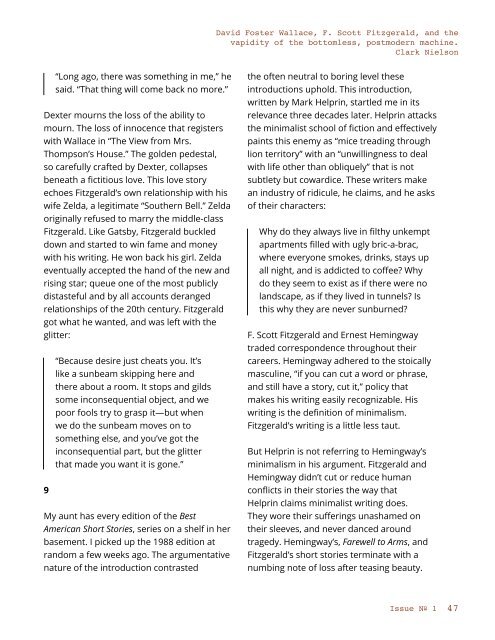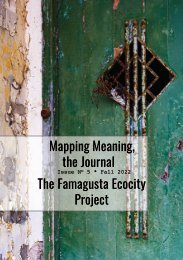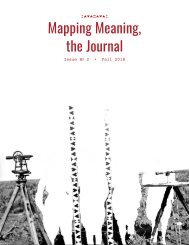Mapping Meaning, the Journal (Issue No. 1)
You also want an ePaper? Increase the reach of your titles
YUMPU automatically turns print PDFs into web optimized ePapers that Google loves.
David Foster Wallace, F. Scott Fitzgerald, and <strong>the</strong><br />
vapidity of <strong>the</strong> bottomless, postmodern machine.<br />
Clark Nielson<br />
“Long ago, <strong>the</strong>re was something in me,” he<br />
said. “That thing will come back no more.”<br />
Dexter mourns <strong>the</strong> loss of <strong>the</strong> ability to<br />
mourn. The loss of innocence that registers<br />
with Wallace in “The View from Mrs.<br />
Thompson’s House.” The golden pedestal,<br />
so carefully crafted by Dexter, collapses<br />
beneath a fictitious love. This love story<br />
echoes Fitzgerald’s own relationship with his<br />
wife Zelda, a legitimate “Sou<strong>the</strong>rn Bell.” Zelda<br />
originally refused to marry <strong>the</strong> middle-class<br />
Fitzgerald. Like Gatsby, Fitzgerald buckled<br />
down and started to win fame and money<br />
with his writing. He won back his girl. Zelda<br />
eventually accepted <strong>the</strong> hand of <strong>the</strong> new and<br />
rising star; queue one of <strong>the</strong> most publicly<br />
distasteful and by all accounts deranged<br />
relationships of <strong>the</strong> 20th century. Fitzgerald<br />
got what he wanted, and was left with <strong>the</strong><br />
glitter:<br />
“Because desire just cheats you. It’s<br />
like a sunbeam skipping here and<br />
<strong>the</strong>re about a room. It stops and gilds<br />
some inconsequential object, and we<br />
poor fools try to grasp it—but when<br />
we do <strong>the</strong> sunbeam moves on to<br />
something else, and you’ve got <strong>the</strong><br />
inconsequential part, but <strong>the</strong> glitter<br />
that made you want it is gone.”<br />
9<br />
My aunt has every edition of <strong>the</strong> Best<br />
American Short Stories, series on a shelf in her<br />
basement. I picked up <strong>the</strong> 1988 edition at<br />
random a few weeks ago. The argumentative<br />
nature of <strong>the</strong> introduction contrasted<br />
<strong>the</strong> often neutral to boring level <strong>the</strong>se<br />
introductions uphold. This introduction,<br />
written by Mark Helprin, startled me in its<br />
relevance three decades later. Helprin attacks<br />
<strong>the</strong> minimalist school of fiction and effectively<br />
paints this enemy as “mice treading through<br />
lion territory” with an “unwillingness to deal<br />
with life o<strong>the</strong>r than obliquely” that is not<br />
subtlety but cowardice. These writers make<br />
an industry of ridicule, he claims, and he asks<br />
of <strong>the</strong>ir characters:<br />
Why do <strong>the</strong>y always live in filthy unkempt<br />
apartments filled with ugly bric-a-brac,<br />
where everyone smokes, drinks, stays up<br />
all night, and is addicted to coffee? Why<br />
do <strong>the</strong>y seem to exist as if <strong>the</strong>re were no<br />
landscape, as if <strong>the</strong>y lived in tunnels? Is<br />
this why <strong>the</strong>y are never sunburned?<br />
F. Scott Fitzgerald and Ernest Hemingway<br />
traded correspondence throughout <strong>the</strong>ir<br />
careers. Hemingway adhered to <strong>the</strong> stoically<br />
masculine, “if you can cut a word or phrase,<br />
and still have a story, cut it,” policy that<br />
makes his writing easily recognizable. His<br />
writing is <strong>the</strong> definition of minimalism.<br />
Fitzgerald’s writing is a little less taut.<br />
But Helprin is not referring to Hemingway’s<br />
minimalism in his argument. Fitzgerald and<br />
Hemingway didn’t cut or reduce human<br />
conflicts in <strong>the</strong>ir stories <strong>the</strong> way that<br />
Helprin claims minimalist writing does.<br />
They wore <strong>the</strong>ir sufferings unashamed on<br />
<strong>the</strong>ir sleeves, and never danced around<br />
tragedy. Hemingway’s, Farewell to Arms, and<br />
Fitzgerald’s short stories terminate with a<br />
numbing note of loss after teasing beauty.<br />
<strong>Issue</strong> N o 1<br />
47







